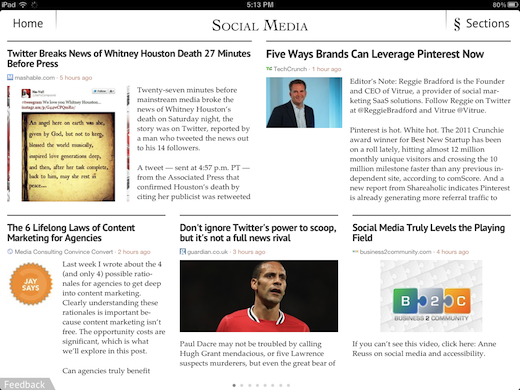I was reading social media news posts in an iPad app I’ve used every day for the past year, when it suddenly struck me.
What I was doing at that moment just two years ago I would have been doing with a search engine.
 The app is Zite. It spiders out through my social networks to monitor for shared content in categories I select. Then it filters that content through a complex heuristic that makes use of social credibility cues. If the content passes a series of other quality assurance gates, it is then displayed to me in an attractive magazine format, each link expanded to a title, sample image, and excerpt, making them easy to browse. Reading and sharing any of those links is just one click away.
The app is Zite. It spiders out through my social networks to monitor for shared content in categories I select. Then it filters that content through a complex heuristic that makes use of social credibility cues. If the content passes a series of other quality assurance gates, it is then displayed to me in an attractive magazine format, each link expanded to a title, sample image, and excerpt, making them easy to browse. Reading and sharing any of those links is just one click away.
Now compare this to just two years ago. If I had wanted to discover new content about social media, I probably would have typed “social media” into Google. The resulting search engine results pages (SERPs) would have given me a bland looking list of page titles and brief “snippet” excerpts, which were too often virtually meaningless. These would have been ranked by Google’s complex algorithms, dependent mostly on a matching of context clues in the content itself with “votes” by links from other sites, and starting in 2007 some amount of cues from social media.
Pretty good results usually, but I had to do a lot of clicking and then scanning myself in order to sniff out what might be worth actually reading. And nothing compared to what an app like Zite does today. Take a look:
Zite monitors and pre-qualifies URLs shared across my social network, then uses a three-fold process to filter the content that will be most useful to me:
- Content Modeling: Zite parses the data from each piece of content, stripping out extraneous material and then analyzing the content for key terms, style, semantic classifications, and metadata.
- Community Modeling: The vetted documents are then relationship-correlated across the social web, building profiles for each user and each document that will be cross-referenced to match to your individual interests.
- User Modeling: Zite watches both your passive and active feedback, what you do and don’t read on the app, as well as your thumbs up/thumbs down voting and checking of “more like this” boxes. Over time Zite builds a model of your interests, and uses patterns in what you seem to like and dislike to more accurately filter the content it shows you.
(Source: Zite Under the Hood)
The result is a personalized search engine that actually learns what interests you to constantly show you better and better content. And it presents it in an attractive, easy-to-scan, easy-to-read format that encourages browsing and discovery. Here’s what a typical Zite page looks like on my iPad:
The Search Engine Catch Up Game
Will apps like Zite be the death of traditional search engines like Google? Hardly. For one thing, Zite is limited to certain predefined categories. There will always be things I want and need to search for that an app like Zite can’t curate on the fly. I wouldn’t use it to find the best pizza in town, nor to do research for a scientific paper, for that matter. In addition, the major search engines are working hard to be better discovery engines.
 Enter Google “Search plus Your World.” The need to stay out front in feeding the appetite of users for ever-better content is likely part (but not all) of why Google has invested so heavily in Google+, and now its “in-your-face” integration into its search results with “Search plus Your World.”
Enter Google “Search plus Your World.” The need to stay out front in feeding the appetite of users for ever-better content is likely part (but not all) of why Google has invested so heavily in Google+, and now its “in-your-face” integration into its search results with “Search plus Your World.”
Similar to apps like Zite, Google seems to believe that content curated through signals from your social networks will be more meaningful to you. But compared to Zite, the implementation of presenting that content has been clumsy so far. If Google wants to build a user experience as rich and rewarding as my morning coffee time with Zite, they will need to pursue at least the following:
- Deeper use of all the social signals to pre-qualify search results. It’s still unclear to what extent Google is taking advantage of all the curation cues being generated within Google+. Those of us who have been testing and comparing results are still left scratching our heads as to why some things are ranking in the personalized results. Google must build robust algorithms that incorporate not only +1s, number of reshares and comments, and follower counts, but also delve into the social graphs and authority/trust rankings of those promoting content.
- Equal opportunity for signals from other social networks. The glaring paucity of results from other major social networks like Twitter and Facebook in Search plus Your World has been one of its most controversial aspects. Without getting into the “he said/she said” debates about why this is so, Google will need to come to some kind of terms with these other networks or its results will always be missing a huge amount of the available social input. Unless of course Google+ somehow becomes bigger than Facebook, in which case no one will care.
- Ability of users to shape and influence their own results. Placing the +1 button next to each result on the SERPs seemed to be a first step toward some kind of “up vote” system. But most agree that it was clumsy and confusing (who would up vote a piece of content they haven’t seen yet?). And users weren’t sure what +1ing was even doing, if anything. Even Google has now downgraded that attempt; the +1 button only shows if you hover your mouse over the right spot after each result. A successful voting component might be dependent upon the next point. Of course, it could be said that Google+ provides that voting aspect, but that’s one step removed from where the user is viewing search results.
- Richer browsing experience. Content display apps like Zite and Flipboard are making the traditional SERPs look like the tape off an old stock ticker machine. The search engine of the future may need to drop the wall of well-ordered ranked titles and URLs in favor of something like the magazine table of contents style of the tablet apps.
What do you think? Are apps like Zite, in both their curation methods and presentation, pointing the way that search engines must go?










